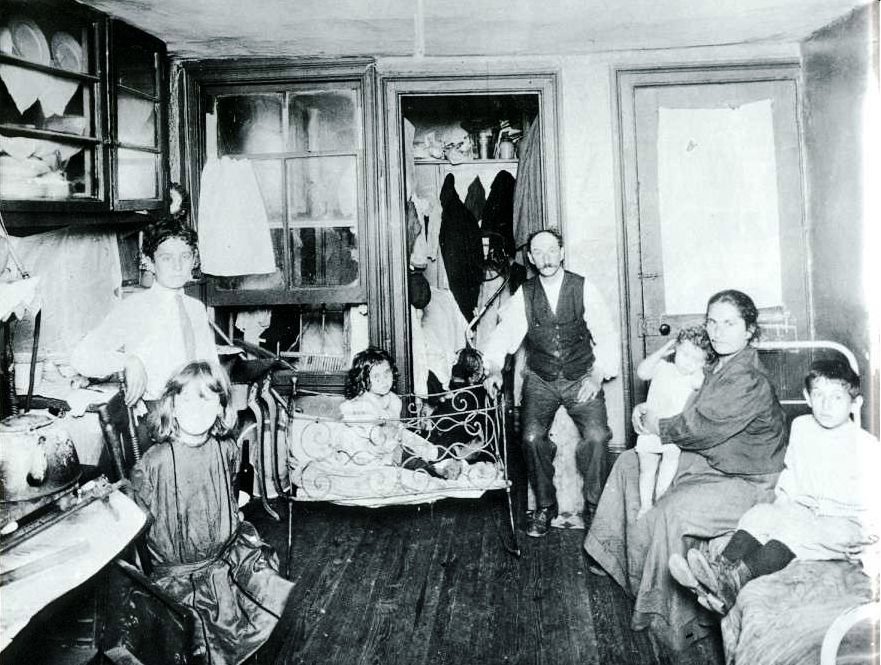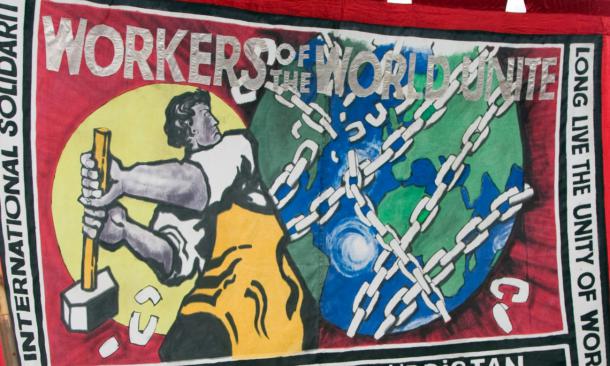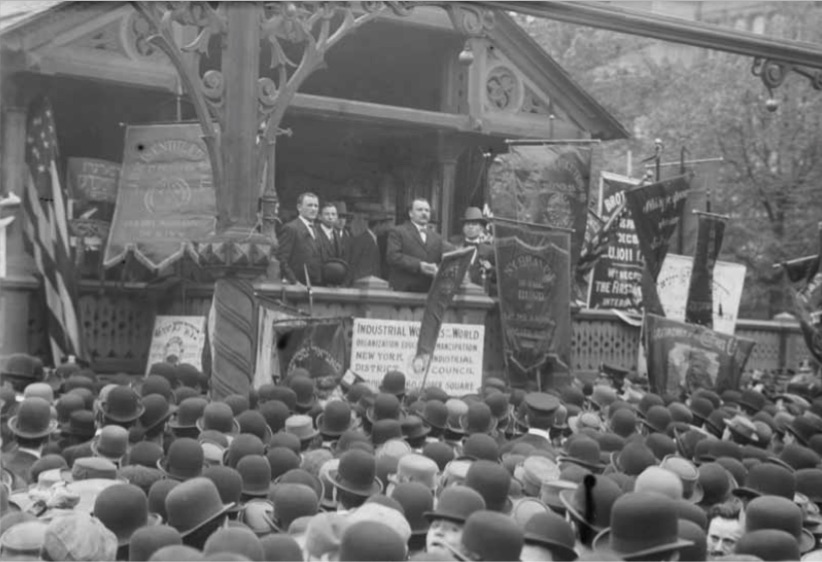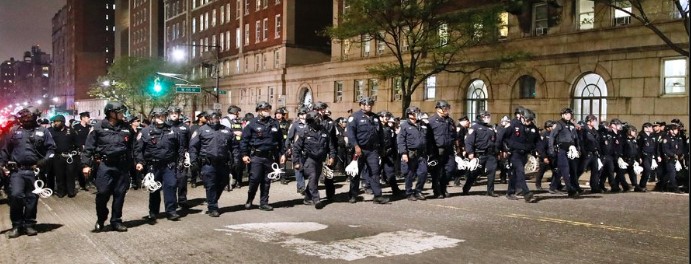This is the first part (of three) of the Workshop Talks section of Socialism Made Easy that Connolly wrote in the USA in 1909. It was designed to provide arguments for workers to use to convince fellow workers of the need for socialism. It is written in a question-and-answer format and in a rhetorical, argumentative, witty and often sarcastic style, and tries to counter the most common anti-socialist talking points pushed by the bosses and their newspapers. What is truly astonishing is how fresh and relevant so much of it is today, 112 years later.
In this first part, Connolly deals with arguments about socialist internationalism. Part two (here) will deal with reform or revolution and confiscating capitalist property. Part three (here) with religion and nationalism. A biographical note about Connolly is included at the end.
**************
“Socialism is a foreign importation”
I know it because I read it in the papers. I also know it to be the case because in every country I have graced with my presence up to the present time, or have heard from, the possessing classes through their organs in the press, and their spokesmen upon the platform have been vociferous and insistent in declaring the foreign origin of Socialism.
In Ireland, Socialism is an English importation, in England they are convinced it was made in Germany, in Germany it is a scheme of traitors in alliance with the French to disrupt the Empire, in France it is an accursed conspiracy to discredit the army which is destined to reconquer Alsace and Lorraine, in Russia it is an English plot to prevent Russian extension towards Asia, in Asia it is known to have been set on foot by American enemies of Chinese and Japanese industrial progress, and in America it is one of the baleful fruits of unrestricted pauper and criminal immigration.
All nations today repudiate Socialism, yet Socialist ideas are conquering all nations. When anything has to be done in a practical direction towards ameliorating the lot of the helpless ones, or towards using the collective force of society in strengthening the hands of the individual, it is sure to be in the intellectual armoury of Socialists that the right weapon is found for the work.
A CASE IN POINT
There are tens of thousands of hungry children in New York today as in every other large American city, and many well-meant efforts have been made to succour them. Free lunches have been opened in the poorest districts, bread lines have been established and charitable organisations are busy visiting homes and schools to find out the worst cases. But all this has only touched the fringes of the destitution, with the additional aggravation that anything passing through the hands of these charitable committees usually costs ten times as much for administration as it bestows on the object of its charity.

Also, that the investigation is usually more effectual in destroying the last vestiges of self-respect in its victims than in succouring their needs.
In the midst of this difficulty, Superintendent Maxwell of the New York Schools sends a letter to a committee of thirteen charitable organisations which had met together to consider the problem, and in this letter, he advocates the method of relieving the distress long since initiated by the Socialist representatives in the Municipality of Paris. I quote from the New York World:
“A committee of seven was appointed to inquire more fully into the question of feeding school children and to report at a subsequent meeting. School Superintendent Maxwell sent a letter advocating the establishment in New York schools, with city money, of lunch kitchens, these to sell food at actual cost and to give to needy children tickets just like those paid for, to the end that no child might know that his fellow was eating at the expense of the city by the color of his ticket. This is done in Paris.”
Contrast this solicitude for the self-respect of the poor children, recognized by Superintendent Maxwell in the plan of these “foreign Socialists”, with the insulting methods of the capitalist “bread lines” and charitable organizations in general.
But all the same, it is too horrible to take practical examples in relieving the distress caused by capitalist society from pestilent agitators, who wish to destroy the society whose victims they are succouring, and mere foreigners, too. The capitalist method of parading mothers and children for an hour in the street before feeding them is more calculated to build up the proper degree of pride in the embryo American citizens; and make them appreciate the benefits their fathers and brothers are asked to vote for.
Read this, telling how hungry children and mothers stood patiently waiting for a meal on the sidewalk, and whoop it up for pure ecstasy of joy that you are permitted to live in a system of society wherein a great metropolitan daily [newspaper] thought that the fact of five hundred children getting a “hearty luncheon” was remarkable enough to deserve a paragraph:
“Five hundred ill-fed children who attend the schools on the lower east side got a hearty luncheon yesterday when the first of the children’s lunchrooms was opened at Canal and Forsyth streets. Long before noon, there was a large gathering of children, some of them accompanied by their mothers, awaiting the opening of the doors.”
“Well, I am not interested in internationalism. This country is good enough for me.”
Is that so? Say: Are you thinking of taking a share in the Moscow-Windau-Rydinsk Railway?
“No, where is that?”
My dear friend, where that railway runs has nothing to do with you. What you have to do is simply to take a share, and have a good time whilst the Russian railway workers, who you do not know, working in a country you never saw, speaking a language you don’t understand, earn your dividend by the sweat of their brows.
Curious ain’t it?
We Socialists are always talking about the international solidarity of labour, about the oneness of our interests all over the world, and ever and anon working off our heaving chests a peroration on the bonds of fraternal sympathy which should unite the wage slaves of the capitalist system.
But there is another kind of bond – Russian Railway bonds – which join, not the workers, but the idlers of the world in fraternal sympathy, and which creates among the members of the capitalist class a feeling of identity of interest, of international solidarity, which they don’t perorate about but which is more potent and effective notwithstanding.

You do not fully recognise the fact that the internationality of Socialism is at most but a lame and halting attempt to create a counterpose to the internationality of capitalism. Yet, so it is.
Here is a case in point. The Moscow-Windau-Rydinsk railway is, as its name indicates, a railway running, or proposed to run, from one part of Russia to another. You would think that that concerned the Russian people only, and that our patriotic capitalist class, always so ready to declare against working class Socialists with international sympathies, would never look at it or touch it.
You would not think that Ireland, for example – whose professional patriots are forever telling the gullible working men that Ireland will be ruined for the lack of capital and enterprise – would be a good country to find money in to finance a Russian railway.
Yet observe the fact. All the Dublin papers of Monday June 12, 1899, contained the prospectus of this far away Russian railway, offered for the investment of Irish capitalists, and offered by a firm of London stockbrokers who are astute enough not to waste money in endeavouring to catch fish in waters where they were not in the habit of biting freely.
And in the midst of the Russian revolution [of 1905] the agents of the Czar succeeded in obtaining almost unlimited treasures in the United States to pay the expenses of throttling the infant Liberty.
As the shares in Russian railways were sold in Ireland, as Russian bonds were sold in America, so the shares in American mines, railroads and factories are bought and sold on all the stock exchanges in Europe and Asia by men who never saw America in their lifetime.
CAPITAL IS INTERNATIONAL
The shares of Russian railways, African mines, Nicaraguan canals, Chilean gas works, Norwegian timber, Mexican water works, Canadian fur trappings, Australian kanaka slave trade, Indian tea plantations, Japanese linen factories, Chinese cotton mills, European national and municipal debts, United States bonanza farms are bought and sold every day by investors, many of whom never saw any one of the countries in which their money is invested, but who have, by virtue of so investing, a legal right to a share of the plunder extracted under the capitalist system from the wage workers whose bone and sinew earn the dividends upon the bonds they have purchased.
When our investing classes purchase a share in any capitalist concern, in any country whatsoever, they do so, not in order to build up a useful industry, but because the act of purchase endows them with a prospective share of the spoils it is proposed to wring from labour.
Therefore, every member of the investing classes is interested, to the extent of his investments, present or prospective, in the subjection of Labour all over the world.
That is the internationality of Capital and Capitalism.
The wage worker is oppressed under this system in the interests of a class of capitalist investors who may be living thousands of miles away and whose very names are unknown to him.
He is, therefore, interested in every revolt of Labour all over the world, for the very individuals against whom the revolt may be directed may – by the wondrous mechanism of the capitalist system – through shares, bonds, national and municipal debts – be the parasites who are sucking his blood also.
This is one of the underlying facts inspiring the internationalism of Labour and Socialism.
***
Notes
James Connolly (1868- 1916) was a giant of the pre-WW1 socialist movement, and played an important role in Scotland, Ireland and the USA. He was born in Edinburgh to Irish parents and grew up in the slums. Starting work at 11, he joined the British Army (which he came to hate) at just 14, deserting 7 years later. He was heavily influenced by Marxism and took part in the Social Democratic Federation and the ILP. Moving to Dublin in the late 1890s he founded the Irish Socialist Republican Party. He later became a socialist full-time activist in the USA (1903-1910) and when this booklet was written (1909), was a member of the Socialist Party of America and the Industrial Workers of the World (IWW) trade union – the famous “Wobblies”. In 1910 he returned to Dublin, working closely with James Larkin in the Irish Transport and General Workers Union (ITGWU) and during the 1913 Dublin Lockout, formed the Irish Citizen Army to defend workers from brutal attacks. He founded the Irish Labour Party in 1912. He opposed the First World War and was one of the leaders of the Easter Rising against British rule in 1916, after which he was captured and executed.



